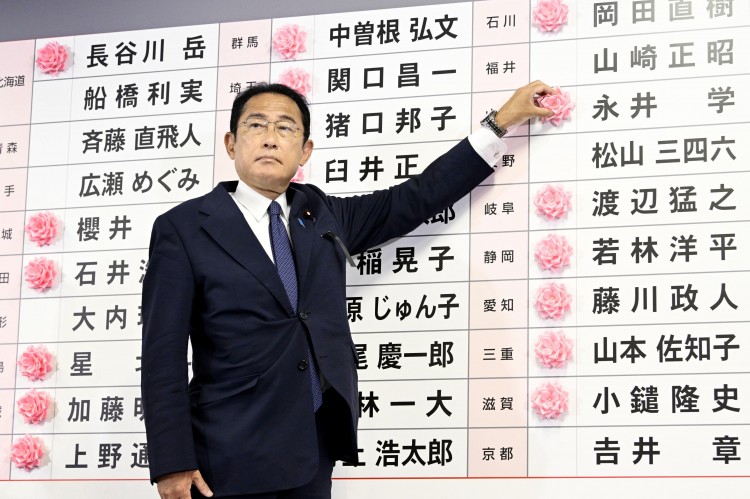Tokyo, 10 July, /AJMEDIA/
Japan’s ruling coalition is set to win more than half of the upper house seats contested in Sunday’s election, Kyodo News exit polls showed, giving Prime Minister Fumio Kishida a comfortable victory in the immediate aftermath of the assassination of a former Japanese premier that stunned the nation.
Kishida’s Liberal Democratic Party and its junior coalition partner Komeito are projected to grab more than 63 of the 125 seats up for grabs. The expected outcome would allow the ruling bloc to retain a majority in the 248-member House of Councillors.
The pro-constitutional amendment camp, comprising the LDP-Komeito coalition, two opposition parties and independents, is also on course to maintain its critical two-thirds majority in the upper chamber needed to push for a first-ever revision of the Constitution.
The election outcome appears to be a vote of confidence in the roughly nine-month-old administration led by Kishida, who had set a goal for the coalition to keep its majority in the upper house.
The LDP is projected to build on the 55 seats it held before the election. In the shadow of the strong showing by the ruling camp, the major opposition Constitutional Democratic Party of Japan, which held 23 seats, is projected to see its seats dwindle.
The opposition Japan Innovation Party, which advocates constitutional reform, is expected to gain seats in the upper house, the polls showed.
Kishida took office last October pledging all-out efforts to cope with the COVID-19 pandemic.
The fresh mandate will also enable him to proceed with his push for a new capitalism, designed to redistribute wealth, with no national election expected until 2025 unless Kishida dissolves the House of Representatives, the more powerful lower chamber of parliament.
The prime minister is expected to reshuffle his Cabinet and ruling party executives by September, according to LDP sources.
The fatal shooting during campaigning Friday of Shinzo Abe, Japan’s longest-serving prime minister and a key LDP figure, rocked the nation, unifying major parties in their resolve not to yield to political violence.
The shockwaves are expected to reverberate in Japan’s political world, with the LDP losing one of the staunchest supporters of constitutional reform and an advocate of more defense and fiscal spending to raise the country’s global standing.
The behavior of swing voters has been another focus of the election with voter turnout higher than in the previous race in 2019 as of 7:30 p.m.
Elections are held for half of the upper house seats every three years. This time, a total of 125 seats are up for grabs, comprising the 124 whose terms have expired plus one vacancy in the other half of the chamber’s seats.
A total of 545 candidates vied for the 125 seats — 74 in electoral districts and 50 by proportional representation, plus the one vacant seat. The total includes a record 181 female candidates.
Ruling and opposition parties had sparred over ways to help households hit by the rising cost of living, partly blamed on Russia’s war in Ukraine and a weak yen and seen as a rare occurrence in a nation known for deflationary mindsets among firms and consumers.
Kishida, the head of the LDP, had pledged to take steps to soften the blow from rising prices, while opposition parties, including the CDPJ, lashed out at his administration for doing little, calling the price trend “Kishida inflation.”
Opposition parties called for reducing or eliminating the consumption tax, currently at 10 percent.
Parties differed on how Japan should bolster its defense to cope with security threats increasingly highlighted by Russia’s war in Ukraine, an assertive China and a nuclear-armed North Korea.
The LDP pledged to strengthen Japan’s defense capabilities with an eye on boosting its defense budget to 2 percent or more of gross domestic product.
That stance contrasted with Komeito and the CDPJ, which see the need first to discuss the substance, not size, of defense spending.
The LDP’s constitutional reform proposals include amending the war-renouncing Article 9, a sensitive issue for South Korea and China, both of which suffered from Japan’s wartime militarism.
The LDP aims to end the debate over the constitutionality of the Self-Defense Forces by explicitly mentioning them in a revised version.
Underscoring the severity of the security environment, Komeito showed a tilt toward the conservative LDP, saying in its election campaign that it would “consider” the need to add such a reference, while the CDPJ was opposed to the LDP plan.
As the Group of Seven industrialized nations seek to cut dependence on Russian energy, Japan also faces the challenge of ensuring energy security.
The restart of nuclear power plants, taken offline following the 2011 Fukushima disaster, remains a sensitive issue in Japan.
The LDP is pushing for maximum use of nuclear power and renewable energy, while the CDPJ said it is aiming for a society that is not reliant on fossil fuels and nuclear power.

